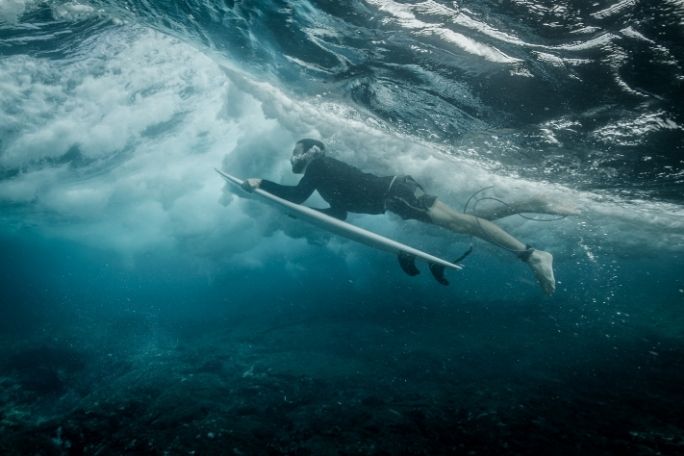Lesson summary
This lesson incorporates clips from Blue The Film as learning inspiration. In this lesson, students will explore rhetorical devices and their influence over audiences. They will consider ways individuals use language to communicate thoughts and opinions, by watching a short clip featuring perspectives about the impact of plastic. They will further develop their understanding of persuasion by studying the rhetorical devices and how they can be used to engage and persuade audiences. Students apply this knowledge to compare the use of rhetoric in two clip clips about plastic and its impact on the environment and ecosystems.
Learning intentions:
Students will...
- understand rhetorical devices and how they are used in media to persuade audiences about issues
- understand that choices made in constructing persuasive texts are influenced by purpose and context
- understand approaches to expressing ideas, values and attitudes about issues and the impact of these approaches on audiences.
Success criteria:
Students can...
- explain rhetorical devices and how they are used to persuade
- identify and explain the effects of specific rhetorical choices on audiences
- describe the way that attitudes can be expressed in different ways to engage audiences.
Lesson guides and printables
Lesson details
Curriculum mapping
Australian curriculum content descriptions:
Year 10 English:
- Analyse and evaluate how people, cultures, places, events, objects and concepts are represented in texts, including media texts, through language, structural and/or visual choices (ACELY1749).
- Evaluate the impact on audiences of different choices in the representation of still and moving images (ACELA1572).
- Compare the purposes, text structures and language features of traditional and contemporary texts in different media (ACELA1566).
Syllabus outcomes: EN5-1A, EN5-6C, EN5-8D
General capabilities: Literacy, Critical and Creative Thinking
Cross-curriculum priority: Sustainability OI.7, OI.9
Relevant parts of Year 10 English achievement standards: Students evaluate how text structures can be used in innovative ways by different authors. They explain how the choice of language features, images and vocabulary contributes to the development of individual style. They listen for ways features within texts can be manipulated to achieve particular effects. Students explain different viewpoints, attitudes and perspectives through the development of cohesive and logical arguments.
Unit of work: Blue The Film – English – Year 9&10
Time required: 90 mins.
Level of teacher scaffolding: High – facilitate class discussion and assess student work.
Resources required
- Student Worksheet – one per student
- Device capable of presenting a website to the class
- Rhetorical Devices Factsheet (one per student)
- How Do We Combat Our Plastic Addiction? – Transcript (optional)
Skills
This lesson is designed to build students’ competencies in the following skills:
- Communication
- Creativity
- Critical thinking
- Global citizenship
- Social skills
Additional info
Blue is a feature documentary film charting the drastic decline in the health of our oceans. With more than half of all marine life lost and the expansion of the industrialization of the seas, the film sets out the challenges we are facing and the opportunities for positive change. Blue changes the way we think about our liquid world and inspires the audience to action. Find out how to screen or download the film here. Along with the film is an ambitious global campaign to create advocacy and behaviour change through the #oceanguardian movement. To become an ocean guardian, see the website.


Welcome back!
Don't have an account yet?
Log in with:
By signing up to Cool.org you consent and agree to Cool's privacy policy to
store, manage and process your personal information. To read more, please see
our privacy policy here(Opens in new tab).
Create your free Cool.org account.
Many of our resources are free, with an option to upgrade to Cool+ for premium content.
Already have an account?
Sign up with:
By signing up to Cool.org you consent and agree to Cool's privacy policy to
store, manage and process your personal information. To read more, please see
our privacy policy here(Opens in new tab).